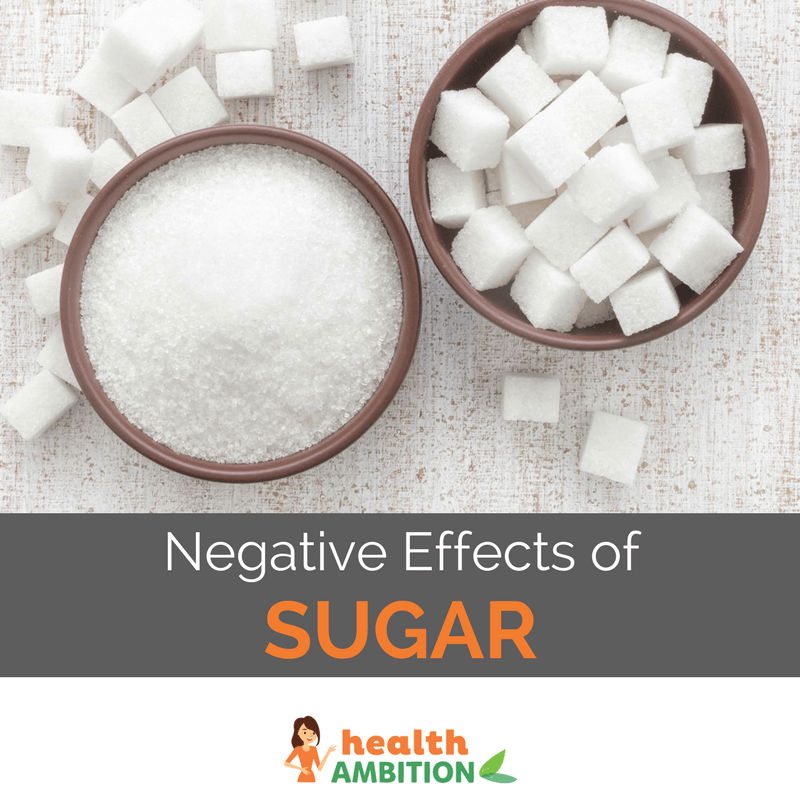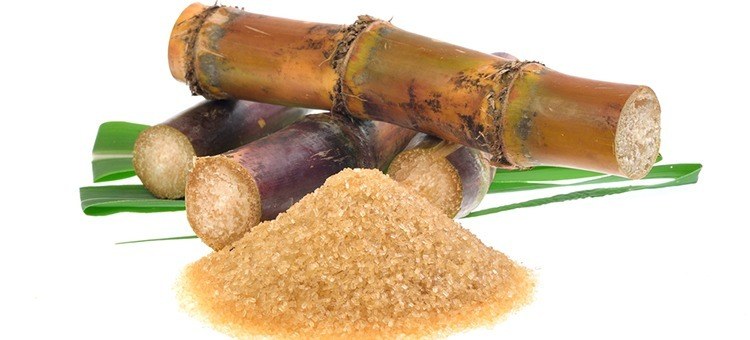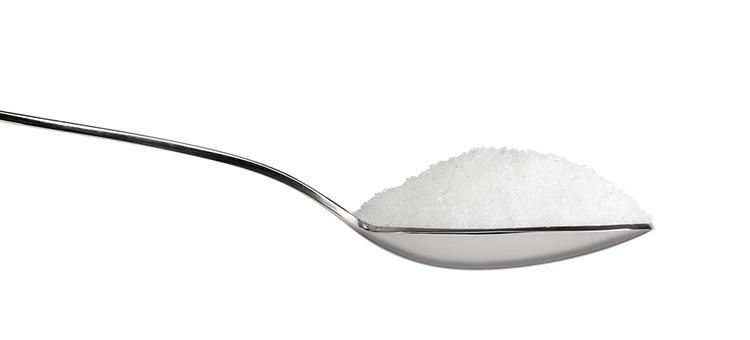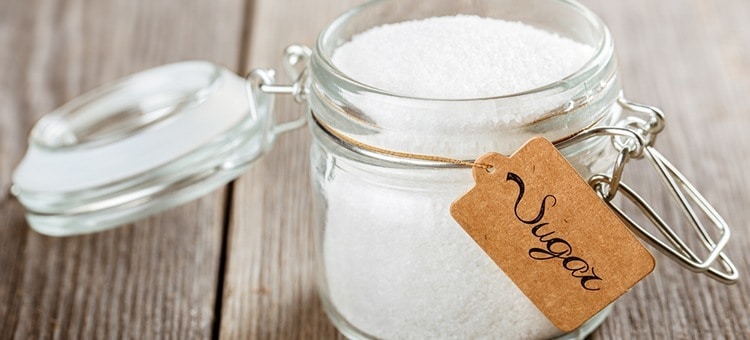
Sugar and spice and everything … not so nice? Sugar is probably not the first thing that comes to mind when you think about substances that cause disease.
Sugar has long been touted as “natural” and the least of your worries when thinking about health and weight loss.
However, a lot of damage can be done when you consume sugar on a regular and excessive basis. And, besides the fact that sugar calories really do add up, sugar also causes a cascade of additional problems in your body from immune system suppression to aging.
Sugar “only” has 15 calories per teaspoon. That doesn’t really sound like much of a problem until you realize that hardly anything has just one teaspoon of sugar in it.
Sugar is in practically everything we eat. Although some sources do occur naturally, like the sugars found in milk products and potatoes or fruit, it’s still good practice to limit your sugar intake and seek out the hidden sugars in your diet.

Is it Natural?
Is sugar really “natural”? If you really want natural, you’d have to break off a piece of sugar cane and eat that for the true natural version of sugar.
The white, granular, powdery stuff that comes out of huge factories, after it’s been processed and manipulated by man with various chemicals and additives, is not a natural substance. And the effects of sugar on your body, health, and well-being are far from “natural”.
Sugar Consumption is Big Business
Sugar is big business and big business means big money. The website www.sugar.org advocates bringing the family together by baking with sugar. They say, “Family means everything and baking is an easy way to show just how much you care.”
It’s kind of like the scenario where your grandmother cooks all kinds of delicious foods for you and you “have” to eat them to show your love and appreciation for her.
Although, truth be told, if you truly cared for each other, you’d find ways to eradicate sugar from your baking and your lives.
The website goes on to say that “Sugar is more than a “fun” food ingredient, it’s an essential one as well. Because it’s all-natural, you can consume it with confidence.”
Well, don’t believe everything you read on the internet. And, don’t believe everything you were taught growing up. When you start to research sugar, and it’s real effects on your body and your health, you will uncover some shocking facts.
“It is our government support of big sugar that keeps the prices of junk food cheaper than real food, and that is part of the problem” says Leslie Cerier of The Organic Gourmet.

Get the Know on How Much You’re Consuming
Most labels list sugar in “grams”. This can make it very confusing for most of us. A teaspoon of granulated white sugar is equal to about 4 grams.
Therefore, take the grams of sugar listed in the food item and divide by 4 to get an approximate number of teaspoons. For example, a bottle of innocent-looking Snapple “All Natural” Lemon Tea has nine teaspoons of sugar in it.
One of my old favorites, a Starbucks Venti Non-Fat Caramel Macchiato, has 44 grams of sugar in it, which translates to about 11 teaspoons of sugar.
That’s a whole lot of sugar for something we think of as a benign and healthy low fat or fat free drink.
Sugar Aliases
Sugar is everywhere. It’s in places that you’d least expect to find it, like ketchup and other condiments, peanut butter, sauces, yogurts, deli meats, soups, juices, cereals and more.
Many foods also have a high natural sugar content and these should also be avoided for the most part.
Just because something is labeled “fat-free” or “low fat”, doesn’t mean that it’s healthy or sugar free. A lot of “diet” foods are actually sugar-laden health traps.
Things that are fat-free are generally overloaded with sugar to give you extra “taste” because the fat has been removed.
High fructose corn syrup (HFCS) is another fancy name for sugar and something that should be avoided at all costs. This substance is found in almost everything.
Some other hidden sources of sugar are items like yogurts, milks, and other various dairy products. They contain milk sugars (lactose). While you wouldn’t expect a glass of milk to have any negative side effects, the sugars found in dairy products still count as sugar to your body.
Alcohol, a particularly sneaky culprit, has 7 empty calories per gram. And, another reason not to go overboard with alcohol is that it’s converted to sugar in your body when you drink it.
Some other, lesser known aliases for sugar include: malt, fructose, glucose, dextrose, lactose, maltodextrin, sorbitol, sorghum, sucrose, mannitol, and many others.

The Negative Effects of Sugar
Sugar Has No Nutritional Benefits and Will Rot Your Teeth
There is literally no nutritional benefits associated with the consumption of sugar. There is no protein, vitamins, minerals or essential fats – just empty calories!
In fact, those who regularly consume 20% of their calories from sugar can end up with a whole host of nutritional deficiencies.
Plus, being told “sugar will rot your teeth” as a child was not just your mother’s way of coaxing away those chocolate chip cookies. It’s actually a cold, hard fact.
Science tells us that sugar actually provides energy for the bad bacteria in your mouth, making it very bad for your teeth.
Fructose Can Overload Your Liver
It is important to understand that sugar comes in two forms: glucose and fructose.
Now glucose is natural, it is found in every living cell and if we don’t get any in our diet, our body will produce it anyway.
Fructose however is different. Our body is only capable of dealing with small amounts at one time.
It doesn’t cause a significant problem if we get a small amount like from fruit, or we just finished a workout. When this happens, the fructose will be turned into glycogen and stored in the liver until we need it.
With that said, if the liver is already full of glycogen, which is usually the case, eating a lot of fructose will overload the liver and cause it to turn the fructose into fat.
When this happens time and time again, this process can lead to a fatty liver which can cause a plethora of serious problems.
One of them being the potential development of Non-Alcoholic Fatty Liver Disease (NAFLD), which is becoming a serious problem in Western countries.
Sugar Can Give You Cancer
Cancer is that word we all dread and unfortunately, is one of the leading causes of death throughout the world.
Cancer is when cells grow and multiply uncontrollably and can affect pretty much any part of the human body.
Insulin is a key hormone in the body and one of its functions is to regulate cell growth. However, overloading your body with sugar can lead to insulin resistance, meaning the cells your cells become able to resist the effects of insulin.
This is why many scientists believe that too much sugar can cause cancer.

Insulin Resistance Can Lead to Type 2 Diabetes
When your cells start to become resistant to insulin, your body produces more of this important hormone in order to level out blood sugar.
However, insulin resistance is progressive and as the situation gets worse, your body simply cannot keep up with the demand for insulin.
This is when your blood sugar levels go through the roof and you are left with type 2 diabetes.
Take into account that science tells us that people who drink sugar sweetened beverages are actually 83% more likely to develop type 2 diabetes.

Alternatives
Luckily, there are some sweet alternatives to sugar. While there have been, and continue to be, many artificial sweeteners on the market, there are some choices that are better than others.
First and foremost, satisfying your sweet tooth with the goodness of fruits and berries is a good option. But again, too much of a good thing is still too much. You don’t want to consistently fill your diet with high glycemic foods, even healthy choices like fruits. Your goal should be to keep your blood sugar low and stable.
Try stevia for a great sugar substitute. Stevia comes from a leaf and does not affect blood glucose levels. It is a great sugar alternative, especially for those with diabetes. Stevia comes in various forms like liquid drops or powders. You can purchase it in packets as well. Some of the brand names for stevia are Truvia, Sweet Leaf, Stevia In The Raw, and PureVia.
Splenda, also known as sucralose, is another popular sweetener. Although it doesn’t share the healthy reputation of stevia, splenda has been used for years. It’s not a natural sweetener. It’s a chlorinated artificial sweetener, so user beware.
Xylitol is yet another sweetening option. It is a “sugar alcohol”. Sugar alcohols often cause diarrhea and bloating, so test your tolerance first with xylitol before consuming large amounts.

Final Thoughts
To conclude, the best thing to do, if you’ve been on a sugar binge for most of your life, is to start phasing sugar out of your life. You don’t have to go cold turkey.
If you don’t believe sugar is all that bad for you, just eliminate it from your life for a while and see how you feel, watch your energy levels soar, your immune system come to life, and your skin glow. Then, decide for yourself.
The bottom line is, try to wean yourself from sugar. And, learn to enjoy the truly natural sweetness of fruits and berries. And, if you must use sweeteners to make your food more interesting, there are many alternatives from which to choose. However, if your goal is to be as healthy as you can, your best choice is stevia. Moderation is key. Make the best choices you can most of the time, and your life can be pretty sweet.
References:
http://www.huffingtonpost.com/jackie-warner/sugar-diet_b_1244673.html
http://nutrition.about.com/od/askyournutritionist/f/gramconversion.htm
Leave a comment